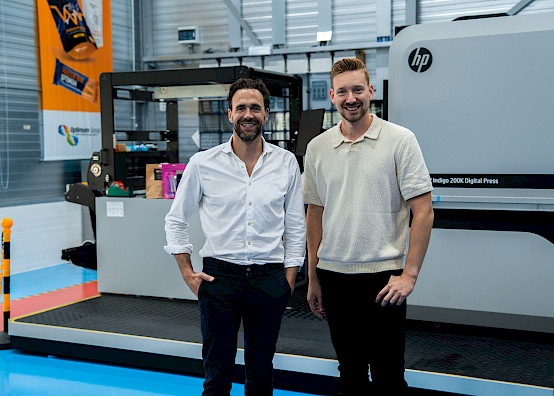30. September 2025
Strategic step Optimum Group – ‘Digital Flexible Pouch Factory’ launched
In Enschede, Optimum Group recently opened the Digital Flexible Pouch Factory. The new production line is designed for smaller runs, short lead times, and sustainable packaging solutions. “We see a clear increase in demand for flexible packaging,” says project coordinator Vincent de Vries of Max Aarts, part of Optimum Group where the factory is located.
Digital Flexible Pouch Factory launched
The investment was driven by the growing market demand for smaller or variable print runs, according to De Vries. “Not everyone starts with millions of pieces. This solution is ideal for companies that want to produce more agilely or seek greater flexibility in their deliveries.” Marketing manager Luuk Wessels also emphasizes the strategic importance: “This expansion fits perfectly with our long-term vision and makes our packaging portfolio more complete.”
Speed and quality as key principles
The Digital Flexible Pouch Factory operates with the HP Indigo 200K, a digital wide-web press designed for speed and consistent print quality. According to De Vries, the press delivers consistent performance with vivid colors and sharp details, even when matching PMS colors. The choice of this technology aligns seamlessly with previous investments within Optimum Group. “We work with HP Indigo at several sites and possess a broad knowledge base within the group,” adds Wessels. “That experience enables us to quickly and effectively integrate new technologies into our processes.”
The production process is fully digital – from file delivery and verification to planning and order execution. This digital workflow makes it possible to respond flexibly to customer needs and continuously optimize processes. By combining scale, experience, and technology, Optimum Group can ensure reliable delivery, even in an increasingly fast-moving market.
A sustainable choice
Sustainability is evident on multiple levels. The factory works with recyclable monomaterials, produces locally, and minimizes waste thanks to digital workflows. “Because customers don’t need to keep large inventories and we can plan efficiently, we save on both materials and logistics,” says Wessels. De Vries adds: “For the same amount of product, you’d need more than twenty trucks with glass jars – but only one with pouches.”
Focus on growth markets
The initial focus is on market segments such as pet food, supplements, and non-food consumer products. “That’s where most demand comes from,” Wessels explains. “But we also produce pouches for textile products like pillowcases.”
Customization and variety
Although standard sizes are available, there is ample room for customization. “With adjustable tools, we can handle a lot of variety – from sizes to closures such as zip or Velcro fasteners and euro holes,” De Vries explains. Settings are stored digitally, which speeds up and simplifies repeat orders. The factory also produces shrink sleeves, sachets, banding rolls, and labels. Wessels: “We deliberately call it the Digital Flexible Pouch Factory, but the offering is broader.”
Ready for the next phase
After a start-up period, the factory is now running full commercial orders. “We now have a stable process and validated materials with which we can serve the market with confidence,” says De Vries. According to Wessels, the factory aligns perfectly with current packaging needs: short time-to-market, personalization, premium appearance, and sustainability. “We can process variable designs within one run, including seasonal or regional variations. That opens new marketing opportunities.”
The Digital Flexible Pouch Factory is therefore seen as an important step toward future-proof packaging solutions. Wessels concludes: “The market is ready – as proven by the influx of orders.”
